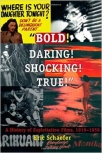Today marks the 40th Anniversary of the day that North Vietnamese tanks rolled through the closed gate in front of Nguyen Van Thieu's Presidential Palace in downtown Saigon and South Vietnam was defeated, finally fallen to the invading North Vietnamese and officially brought to an end what we in the West know as the Vietnam War, and what is still known in Vietnam as the "American War". It was the Fall of Saigon on April 30, 1975, that signaled that the war was finally over.
The war had raged for over ten years of official fighting by the US, and over 24 years of fighting by the Vietnamese, who were eager to rid their country of foreign influence, first the French, whom they kicked out in 1954 and then the Americans whose combat troops left in 1973. For the final two years it was strictly a Civil war between the North Vietnamese and the South Vietnamese.
Nevertheless, it was doomed to end this way, right from the beginning. When the famous north Vietnamese general, Võ Nguyên Giáp*, said that more than a million North Vietnamese casualties a year was an acceptable rate of loss in order to win the war, the Americans did not take him seriously. They should have listened.
The few Americans left in Saigon that day had to beat an ignominious retreat, which is captured so well in his memoir, Decent Interval, written by CIA analyst-on-the-ground Frank Snepp. The remaining Americans, especially the CIA and the ambassador, do not come off well for the most part in Snepp's description of them in the final days.
The CIA and the US Foreign Service were understandably embarrassed by their actions and did not want Snepp to publish this book. The CIA even took him to court to prevent its publication, urging prior restraint of the press for the first time in history. Fortunately they were unsuccessful, and Snepp was able to go ahead and describe the mess that was the US presence at the fall of Saigon.
Later on the CIA actually sued Snepp for violating a "non-disclosure" agreement that held that he -- and all CIA employees -- had to sign when hired, to the effect that they would not write or speak about anything that happened "on the job" without prior approval by the agency. Snepp got assistance from the American Civil Liberties Union (ACLU) and the case went all the way to the US Supreme Court, who ruled against Snepp and held that the book could still be published, but all proceeds from its sales would have to revert to the CIA. See United States v. Frank W. Snepp, III, 897 F.2d 138 (4th Cir. 1990)/
And this is why I am not giving a link to a website where you can purchase the book. I don't know if that proviso is still in effect or not, but it likely is and I'd prefer not to give the CIA money, and so I encourage you to get it from your library and read that copy. If your local library doesn't have it, they can get it through Inter-Library Loan. Or you can download a questionably-legal copy in .pdf from this site for free.
Highly recommended for its day-by-day descriptions of an unraveling embassy and the desperation of its Vietnamese workers and allies, who were given hollow promises that the US would evacuate them as well.
* According to one story, Westmoreland met Giáp at some function years after the war and said, essentially, that the North Vietnamese should never have won that war. The Americans had them outnumbered, with better equipment, with better-trained troops, with better ammunition, with better air power, with a better Navy, and the Americans never lost a battle that they fought with the North Vietnamese.
"This is true, " Giáp said calmly. "It is also irrelevant".











0 Comments:
Post a Comment